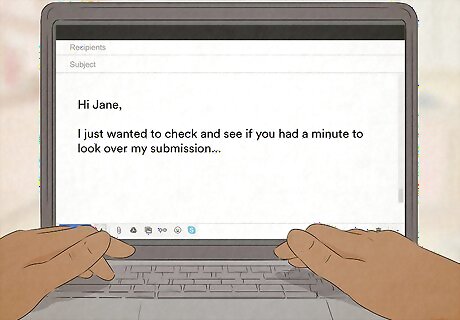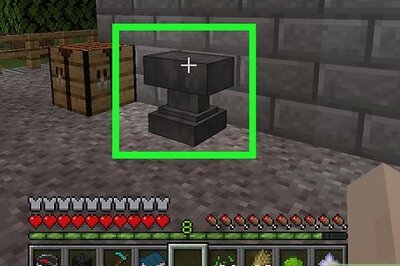
views
Building Your Application

Figure out what you want to do. The point of having an agent is having a professional to help you grow your career. The best agents will be the people who can support what you want to do, but the only way they can do that is if you have a clear sense of the kind of work you want to do. That will help you stand out, and you'll be more likely to find an agent who specializes in the type of acting you'd like to do. Your agent is an industry professional who will try to get you the best jobs for your career. Good agents will certainly offer advice on your decisions, but in the end the choice to try out for or take a job is yours.

Take a headshot. Most agents will need to see a standard headshot, an 8x10 black and white glossy photograph, with your resume. Get one professionally done, and make sure your resume is attached to the back. Although a headshot should be fairly simple, you should still try to capture your personality. Try thinking of 3 "pride words" that describe your image, like "fresh, intelligent, and confident." Then, try to channel those words through your wardrobe, makeup, posing, and facial expressions. While you will only send in one headshot to an agency, it is good to have several done with different looks. If you are looking to be more versatile in gigs, you’ll need to have available shots that demonstrate your ability to fill different roles. If you are a model, you should have a professional portfolio with a wider variety of image, including various colors, poses, and looks.

Create an online presence. A personal website is a good way for agents to follow up on your resume, and provide more information beyond what fits in your cover letter. Include your resume, references, contact information, and additional images or multimedia where appropriate. This is also good for publicizing yourself even without your agent’s help, which is important for growing your career. Use these places to post any headshots and glamour shots you have. Include pieces of any performances you have done (depending on your field), making sure it reflects your chosen field. If you are a musician, for example, pictures are great, but you should also have links to some sound clips. If you don’t have access to particular clips, link to sites that do. Don’t forget to include social media sites like Facebook, LinkedIn, and Google+ for building a professional network and image. Look for industry-specific sites as well, as these are places agents will likely go to check up on your background and other activities. If you are a stage actor, for example, it is a good idea to have a page on Spotlight.

Get referrals. Referrals, that is information from other clients or people in the industry, are a common way for agents to choose clients. As you try out for and take various jobs, use that as a way to meet people and build your network. Another good source for referrals can be other performers the agency represents. When you begin researching agencies, search online to find people they already work with. Then, try reaching out to those existing clients with questions about the agency. Stay in touch with them and build a relationship, then eventually, ask them to introduce you to their agent.

Stay busy. Just like you will shop for agents, agents are shopping for you. If you haven’t done a lot of work, it will be hard for an agent to see you as someone who will bring business. Beyond jobs, you’ll also want to be doing other kinds of lessons and workshops in your field to show your dedication to improving. It may be more difficult to get work without an agent, but hardly impossible. Work with people you know to develop your own smaller independent projects, like web series. Keep an eye out for open auditions, and show up. Your agent will only make it easier to find auditions and deal with paperwork, but you can certainly do those things on your own. This is another great way to build your network in your industry. The more work you do, the more experience you’ll have, and the more people who can speak to an agent about your talent and potential.
Finding an Agent

Find contact information. You’ll need to be able to contact agents and agencies directly. While flipping through a local phone book can get you started, visiting agency websites to learn about the agency, who its clients are, and the kinds of work it does can help narrow your search. Look through the directories of trade organizations like the Association of Talent Agents. They will have lists of their member agencies, plus contact information. Another way to find agents is to look up who represents other talented people in your field. You should target people who are similar to you, or do work close to what you do or want to do in order to find the best agent for your career. Once you have the name of a client or agency, you can search for them directly. Start local. If you are just getting started in the entertainment business, it will be more difficult to get signed by a big talent agency. Smaller, more local agencies may be just as good for getting your foot in the door, getting gigs on your resume, and paving the way for bigger representation later.

Target a specific agent in an agency. You don’t want to send an impersonal letter to the whole agency. Instead, try to target one agent who you think you would work well with, and may have the background to help you advance your career. Do not contact multiple people in the same agency, as that will make you appear desperate and unprofessional.

Study the agent’s affiliations. When you start researching an agent, examine the groups she is connected with and any licenses she has. This can be a good way for you to make sure the person you are dealing with has the right connections and background. Plus, if she is tied to other groups like a performers’ union, the union can provide additional information. Some more prominent professional trade groups for agents include the ATA and the National Association of Talent Representatives.

Write a cover letter. This is a professional business, so you will need to act professionally when contacting agencies. Make sure your package has a brief cover letter that discusses your experience and interest in being represented by that agency. One page should be enough. Make your letter specific. One you find an agent to send your materials to, tailor your letter to address her directly. Be sure to explain not just why you would be good for her agency, but her in particular. Of course, be careful to take care of little details like spelling the agent’s name correctly.

Send a follow up email. Agents are busy people who receive many letters every day, and may not be able to respond. If you haven’t heard anything back, including a rejection, send a follow up note. This is a good way to help your name rise above the pile, and make it more likely you get a response from the agency. Your note should be brief, more of a reminder. A simple email saying “I just wanted to check and see if you had a minute to look over my submission,” gives the agent something to look for. If you are lucky, the agent may respond without prompting. In most cases, though, if you have not heard anything for two weeks, it is probably best to send a follow-up reminder.
Nailing the Interview

Arrive early. Aim to arrive at the agency about 5-10 minutes before your scheduled interview. This can give you a few minutes to use the restroom and settle your thoughts before heading int. You’ll also get a buffer of time in case you get held up for any reason on the way over.

Bring your materials. Make sure you have copies of whatever you sent in when you first contacted the agency. In addition, keep an eye on specific things the agent asks for before the interview. If he asked for them, he will expect to see them, and it will look very bad if you are unprepared. While your website is great for publicity, don’t direct the agent there during your interview. If there is something important on there, make sure you have a copy ready with you for the interview. If this includes some kind of audio or video file, make sure you have a way to present it without having to connect to your website.

Dress properly. Dress for your interview should be smart casual. You are in the entertainment business, not finance. You don’t need to dress like you are going to a board meeting. The important thing is to avoid looking sloppy. For men, there is no need to wear a tie, while women should skip business wear. Keep your wardrobe to a clean, nice looking suit. Be smart too. If you are going to need to move around for your interview, say if you are a dancer, make sure you have clothes that will allow you to do that.

Be prepared for an audition. Meeting with the agent is as much of an audition as any other. Prepare your best material for when you get that call to go sit with an agent. The more variety you can get to your prepared auditions, the more flexible you can be to find something enjoyable or appropriate to demonstrate. For actors, it’s good to have 2-3 monologues ready to go. Make sure they are cover a variety of styles, such as dramatic, classical, and comedic, to show off the full range of your skills. For a field like modeling, this is where you should have a variety of your photos present to demonstrate your versatility. Be prepared with a swimsuit, or something else that will let the agency get a good look at your body.

Prepare your own questions. When you talk to the agency, it is good to have a few questions of your own. Ask about other clients the agency represents, the kind of work the agency has gotten its clients, and what kinds of expectations they would have for you. The interview is also to make sure you are comfortable working with this agent. Don’t be afraid to ask a few questions to learn about what he thinks of your work and career, and where he sees you going professionally. You’re going to need to rely on your agent for career advice, so it needs to be someone you feel comfortable opening up to when you speak.




















Comments
0 comment